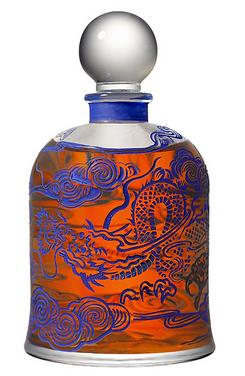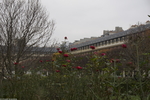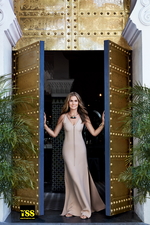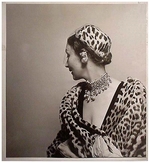Perfume Review & Musings: Mandarine Mandarin by Serge Lutens

The latest creation by Serge Lutens and nose Chris Sheldrake is called Mandarine Mandarin. The lilting name given to the perfume reminds one that the mandarine fruit originally meant "the orange of the mandarin"and originates in East Asia. The historical evocation of an official from the past eating delicious oranges conjures up all the more golden yellow images of Imperial China.
A sumptuous blue celestial Chinese dragon decorates the 30 copies of the limited edition of the perfume which will be available for 800 Euros from November 2006 at the Salons du Palais Royal. The price for a bell-shaped flacon of Mandarine Mandarin, without the blue engraving, is 100 Euros. Notes are Chinese orange, nutmeg, candied orange, peels of mandarins of Sicilia, Black Mandarin, Cashmere musk, clove, honey, beeswax, smoked Chinese tea, thyme, labdanum, rock rose, Tonka bean, and ambergris.
The perfume evokes to me a slightly complicated atmosphere of both intellectual and sensual exoticism. The perfume wearer is invited to travel on the notes of crystallized Chinese orange peels, Lapsang Souchong (black smoked tea), and the drool of the dragon or ambergris, amongst others...
The scent generally speaking seems to smell, curiously, like a patchwork of fragrance families: chypre, cologne, floral-oriental, and gourmand. It is complex but it also smells a bit heteroclite. Being a proteiform and changing perfume, the version of the scent I prefer is when it smells more of a soft and rich orange blossom. It is more complex than the work Sheldrake and Lutens did on the orange blossom for Fleurs d'Oranger. In that stage or version the orange blossom is very enveloping and harmonizes the perfume.
Perfume is often the support of a dream for Lutens and appeals to his fans for this very reason; opening a Lutens flacon is opening the door to many universes. It is perhaps a coincidence but the Chinese believed that ambergris was the congealed drool of dragons sleeping at the bottom of the sea; the blue dragon on the bottle seems to call attention to that note. Mandarine Mandarin showcases a rich ambergris accord hidden in the heart of the perfume as if laid there as a secret clue on the bottom of the sea/fragrance, the perfume in appearance being all about gourmand tea, honey, mandarines, and oranges. We learn that Lutens had an ambergris note specially designed for him. In this manner, although the name of the scent calls attention to the fruit mandarine, the term mandarin with its references to Imperial China taps into a web of cultural allusions.
It always seems that one not only needs to smell a Serge Lutens' scent but that one needs to decode it, an operation which is encouraged by the sybilline texts accompaying the scent(s): "She may not be the Mandarin’s spouse, [but] she reigns in supreme harmony over the Emperor’s very heart…" or again "Sorbets and candied fruits, what complexity this dream without a letter-opener reveals!"(my translation from the French version). The English version reinforces the mystery "Sparkling yet profound, mysterious as a dream...A paradox translated through living and eternal scents of sorbet and crystallized fruits".
Despite these precise and sybilline images, Lutens stresses the importance of chance and fate in the creation of a perfume. I would take his statement with a grain of salt because as this perfume shows, Lutensian perfumes always seem to be very much thought out and willed; they are not relaxed nor relaxing fragrances. Recurring olfactory themes appear also from one perfume to another creating the distinct impression of a body of artistic work.
At a less conscious level, what we get with a Lutens perfume is a maze of interactions between the personal history and dreams of the wearer, those of the author, history, and fate. But perhaps it is not so much the case that you need to enter the oniric universe of Serge Lutens as be encouraged to enter your own as if Lutens were proposing to you an opium pipe in the form of a fragrance bottle.
If thusly led by a gentle hand and invited to think about China (although mandarins were to be found in other East Asian countries) I inhale the scent, what it conjures up for me are images of traditional Chinese wooden furniture and medicine cabinets. I think of the ostentatious furniture and red painted architecture of the Forbidden City, of the breeze gently blewing though the hallways and now scenting the air with sweet citruses and the camphoreous polish of woods. Next, I am walking anew into a gigantic warehouse in Beijing filled to the brim with antique and traditional wooden furniture - again - rescued from the Chinese countryside and gathered to be sold to the newly rich and foreigners. A few seconds elapse and I am brought back further in time to the days where I would often visit Malacca, an ancient Dutch and Portuguese settlement situated on the south-western shore of Malaysia and betraying a strong Chinese influence, where antique wooden furniture are constantly being sanded and polished in musty and cool inner courtyards. The scent also evokes for me all sorts of Chinese condiments such as sweet dried orange peels and spicy fruit pastes that one can easily find in Chinatown. In sum, Mandarine Mandarin as an "ancient eau" evokes for me the antiquity of a Chinese scholar's home furniture, perhaps his study room furniture, fragrant with the aroma of dried orange peels and little balls of wax containing pungent traditional Chinese medicine.
Upon first approach, Mandarine Mandarin seems to behave like a serpentine scent in that an exquisite trail escapes the flacon adopting the sinuousness of the body of a snake or better still that of a twisting dragon. To my nose, it seems to have the characteristic personality of a chypre perfume at first. After an initial outburst of herbal citrusy notes and even to my nose, of a characteristic cologne accord, the scent settles quickly into a quieter mood in which a soft almondey accord. It smells of heliotrope and I am reminded of Datura Noir, also by Serge Lutens. The gourmand naïveté of the heliotrope gradually morphs into the darkness of a metallic animalic dry herbal and resinous accord. The ambergris gathers more and more depth. The fishy undertones of ambergris are very much perceptible. When the floral bouquet unfolds it smells at times more of soft orange blossom, at others of a fruity rose. The jasmine and tuberose lend their indolic notes to the mix. It is a stage where the warmth and the near-syrupy sweetness of the perfume reminds me of Coco by Chanel. As the musky animalic rose develops together with a dash of pepper, it smells strikingly similar to La Rose Jacqueminot by Coty. The smokiness of Lapsang Souchoung comes through in the longer dry down, later still it smells of hay and beeswax. Staying power is better than that of Fleurs d'Oranger but not extraordinary.
I have tried the scent several times and each time it has behaved differently. On initial try, although the scent smelled exquisite at first, it soon developed a characteristic men's cologne accord and, unfortunately, very much evoked for me the image of an airplane bathroom whose confined atmosphere is filled with the concentrated scents of after-shave and cologne. The second time, the cologne seemed to have become more discrete and what came forth were the soft notes of orange blossom, made even more caressing and sweet thanks to honey and jasmine, and which seemed to envelop the scent like a warm blanket. In that version it is also more langorous due to the indolic additions of jasmine and tuberose. On my third try I smelled the presence of a significant rose or floral accord and the ambergris was very much present together with spices.
It is the most elusive and disorienting of the Serge Lutens scents I have encountered so far. A reductionist way of looking at it would be to say that the perfume is unstable. If this instability is willed it certainly pushes the perfume wearer into a non-comfort zone, me at least. I find it a bit irritating as I find myself growing mentally tired of what I perceive to be some jumping around.
Mandarine Mandarin belongs to the range of fragrances exclusively sold at the Salons Shiseido at the Palais Royal in Paris and available within Europe. One will therefore need to count on a friend who goes through or lives in Europe to purchase it. Decants and the occasional bottle are however available on eBay. The perfume is part of the sub-set of the Eaux Anciennes (Timeless Scents) collection. Serge Lutens' fragrances are always interesting to sniff and if you seek the unusual, you should definitely try it (them) out.










Goodness.... that was a thorough, thoughtful, highly descriptive review that leaves me wondering whether I would like this scent. I love your point that they are "not relaxed or relaxing fragrances." Perhaps this is why (heresy!) I admire most SLs as works of art rather than things I wake up wanting to put on.
Marchlion hit the nail right on its proverbial head: I admire SL's fragrances, even test them all, but only a very few are wearable enough for my taste.
With that said, this sounds like an amazing fragrance, and I can't wait to test it.
Hugs!
March,
An analogy I like to make to convey the impression that certain Lutens scents make on me is that they make me feel like I am a gallery exhibiting paintings by Lutens. Some of his scents just stay too much on the surface of the skin. There is no alchemical element, a feeling I love to find in perfumes.
Vi,
One Lutens fragrance I find entirely wearable is Ambre Sultan.
It is certainly worth a serious sniff. There are passages in the fragrance that I love but those passages don't even recur systematically. It ended up making me feel tense due to the undecisive and complicated (more than complex) character of the fragrance.
Bonjour, Helene-
I love your forensic, yet lyrical approach.
Ambre Sultan is a magnificent scent, and it fits like a glove for me; many SL's do, strangely enough. Even ones the SA's don't know what to do with.
So much depends on minutiae- your diet that day, your emotions, your past history,your body chemistry, your expectations ...
I will be curious to sample this.
Bonjour Chaya,
Thank you and absolutely Chaya. It's a good reminder to remain open-minded with perfumes, at the very least for others.
The saying about someone's trash being someone else's treasure and vice-versa never was so true as with perfumes.
Please,who can tell me if mandarine mandarin is for men or for lady?
How much it could cost?
Please,email me: deltacassiopeiae@gmail.com
Thank you.
Jaime Lorenzo Martin.
Please,who can tell me if Mandarine Mandarin is for men or for lady?
How much it could cost?
Please,email me: deltacassiopeiae@gmail.com
Thank you.
Jaime Lorenzo Martin.
Please,who can tell me if mandarine mandarin is for men or for lady?
How much it could cost?
Please,email me: deltacassiopeiae@gmail.com
Thank you.
Jaime Lorenzo Martin.